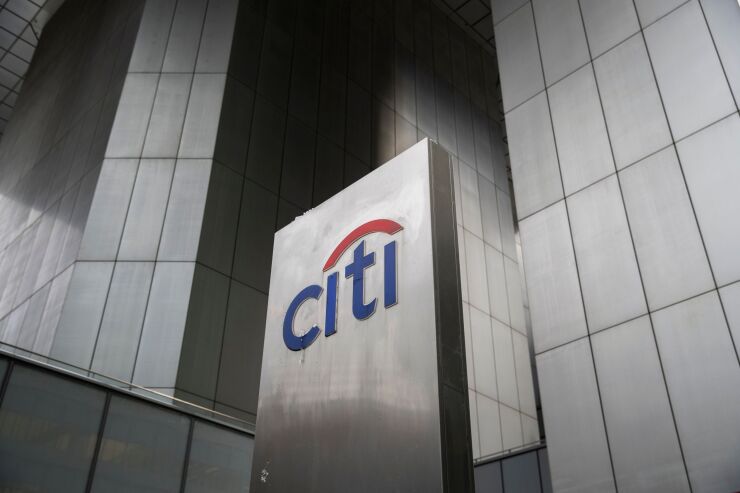A Citigroup employee says she provided U.S. regulators with information that led to the bank's paying a $400 million fine. Now, she wants a judge to award her a share of the penalty.
Tamika Miller, a Citigroup auditor, said she supplied federal officials with documents and other evidence that were “instrumental” to the bank’s 2020 settlement over risk management failures, according to documents filed Monday as part of a federal lawsuit in Manhattan. In seeking a payout from the U.S. government, she’s citing a whistleblower law that allows corporate tipsters to pocket as much as 30% of a sanction. For Miller, that could mean a $120 million windfall.
Blowing the whistle on corporate misdeeds has become lucrative in recent years, with government watchdogs routinely awarding informants millions of dollars for their help with cases. Last year, for example, regulators doled out $200 million to one tipster alone

Miller sued Citigroup in 2019, accusing the bank of committing fraud and invoking the False Claims Act, which enables whistleblowers to bring lawsuits against companies on behalf of the federal government and collect a portion of any settlement. Months later, the Office of the Comptroller of the Currency — an independent bank regulator — fined Citigroup $400 million for offenses similar to the alleged conduct Miller says she originally described as part of her lawsuit. The Justice Department ultimately did not pursue the case. Now, Miller says the OCC fine was an alternative remedy, and that’s why she should be awarded a portion.
A spokesperson for Citigroup and the OCC declined to comment on Monday’s filing. In 2020, the OCC alleged Citigroup had persistent problems with some of its internal compliance programs.
“We are disappointed that we have fallen short of our regulators’ expectations, and we are fully committed to thoroughly addressing the issues identified,” Citigroup said in its statement in response to the original consent order, without admitting wrongdoing.
Miller began sharing relevant information about Citigroup’s compliance procedures with authorities in 2019, according to the filing. Miller, who is based in Texas, said she has worked in Citigroup’s risk department since 2014 after receiving her undergraduate degree in business from Davenport University, based in Michigan, in 2011, the filing said.
According to Miller’s filing, Citigroup lied to regulators about its internal controls and filed fraudulent reports. For years, the bank’s central system that housed all of its audits on outside parties was plagued with conflicts of interests and other problems, Miller alleged.
Citigroup staffers minimized issues in audit reports so they appeared to be minor infractions that didn’t need to be flagged to regulators, when they would otherwise have resulted in a failing grade, Miller said. She also accused Citigroup of altering reviews she wrote — internal ones, as well as those that were distributed to third parties, such as regulators — to downplay concerns she raised about the bank’s controls.
Miller said she reported her concerns to Citigroup’s ethics department in 2018 and was told an investigation would be conducted. Ultimately, she said, the bank informed her no violations were found.
“The ‘investigation’ was hardly an investigation at all,” Miller said in her complaint. “Instead I was instructed going forward not to return to ethics with any future concerns. In fact, I was told to report any future concerns to my senior management, even though it was my senior management who was engaged in manipulating” the system, she said in the filing.
Regulator meetings
Her court motion offers a glimpse into how bank enforcement actions unfold. Within weeks of her having handed over documents detailing Citigroup’s actions to regulators, an attorney for the OCC reached out to ask Miller for more information chronicling the bank’s alleged misdeeds, she said. In the ensuing months, Miller said she spoke with officials at the OCC, and the Consumer Financial Protection Bureau, as well as representatives from the U.S. Attorney for the Southern District of New York.
Miller recounted specific details about her interactions, including how one OCC official wore a medical boot from a foot injury during a meeting. The official also indicated to Miller that they were concerned about her “job security given the damning information” she supplied, according to the filing.
The OCC has its own whistleblower
“As it relates to the consent orders, we are deep into execution mode,” Citigroup Chief Executive Jane Fraser told analysts on a conference call this month.
“We continue to be in constructive dialog with our regulators as we get their feedback and incorporate it into our ongoing execution and project plans.”
The case is United States of America ex rel. vs. Citigroup Inc., 1.19-cv-10970, U.S. District Court for the Southern District of New York (Manhattan).





